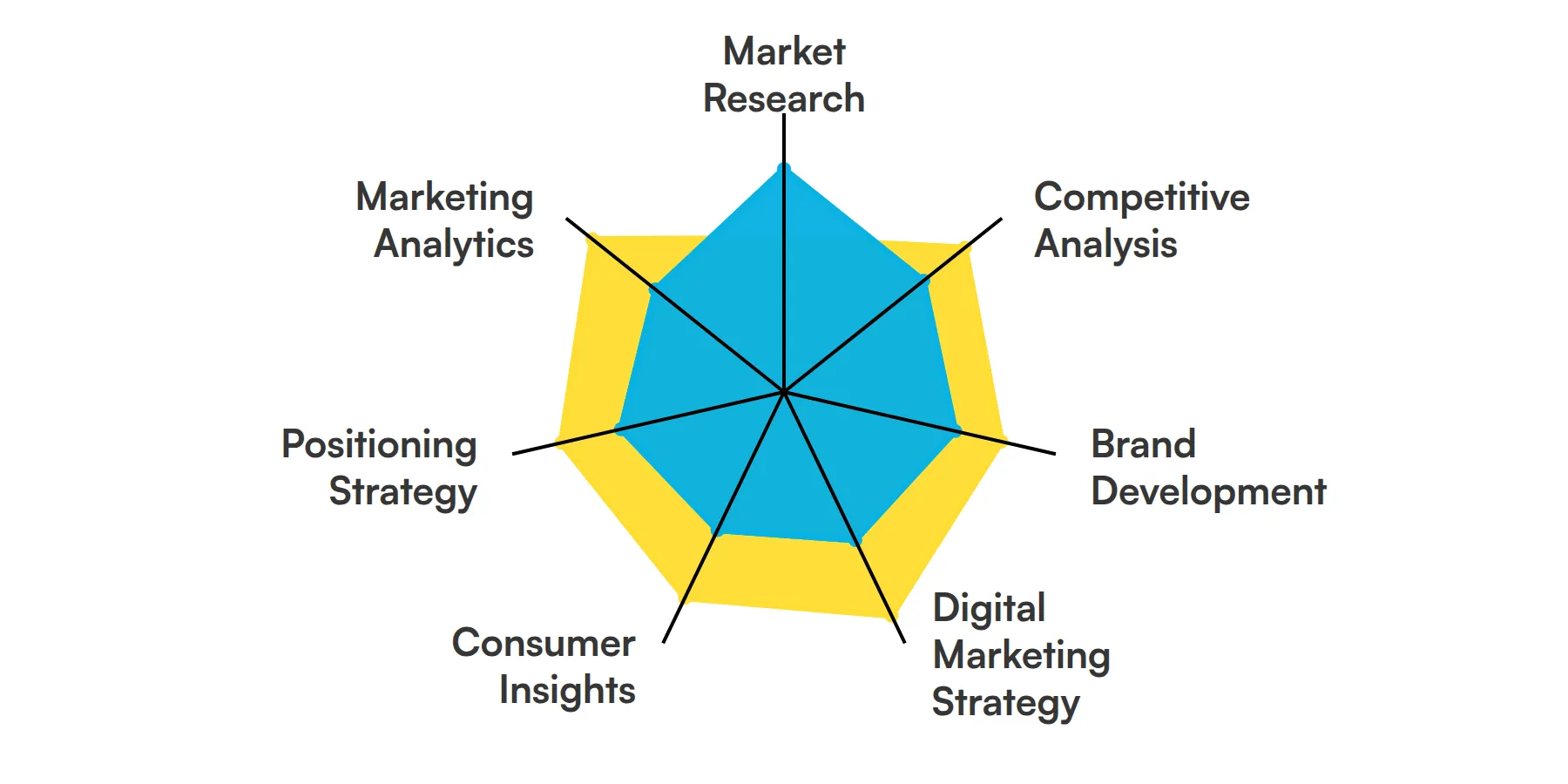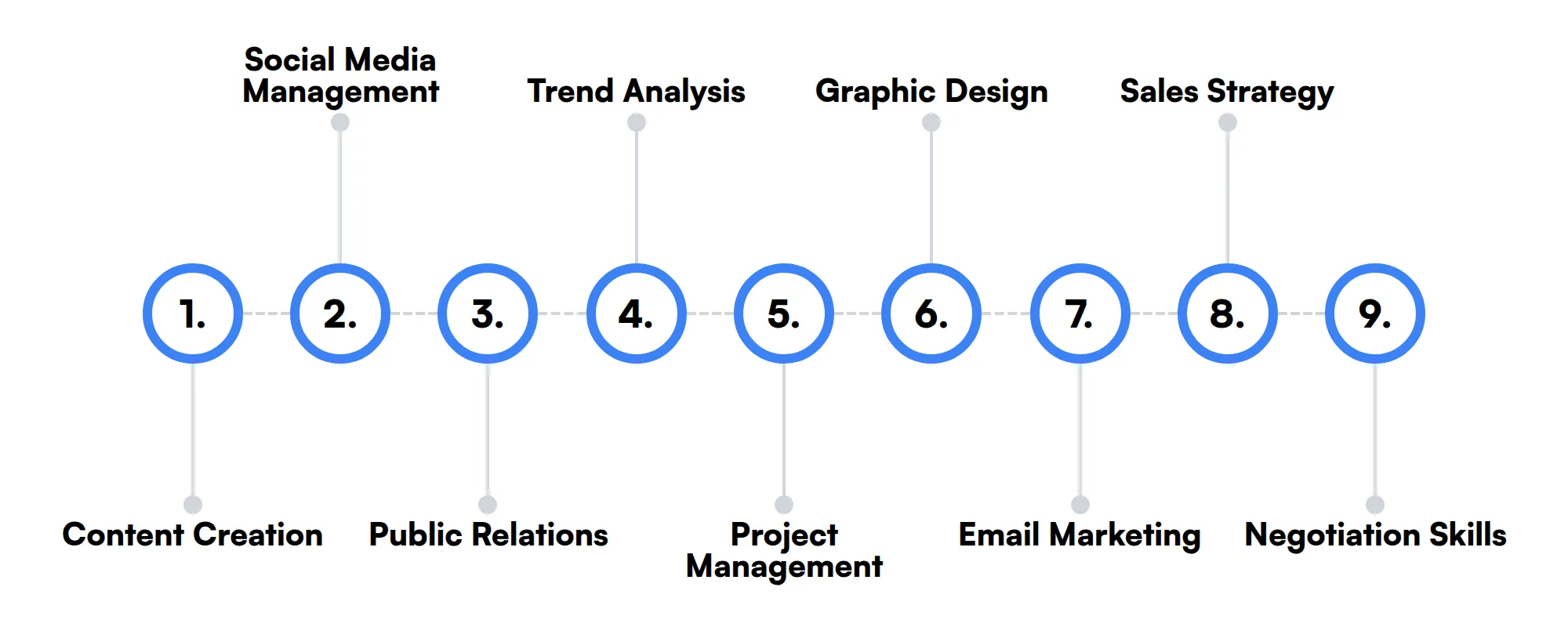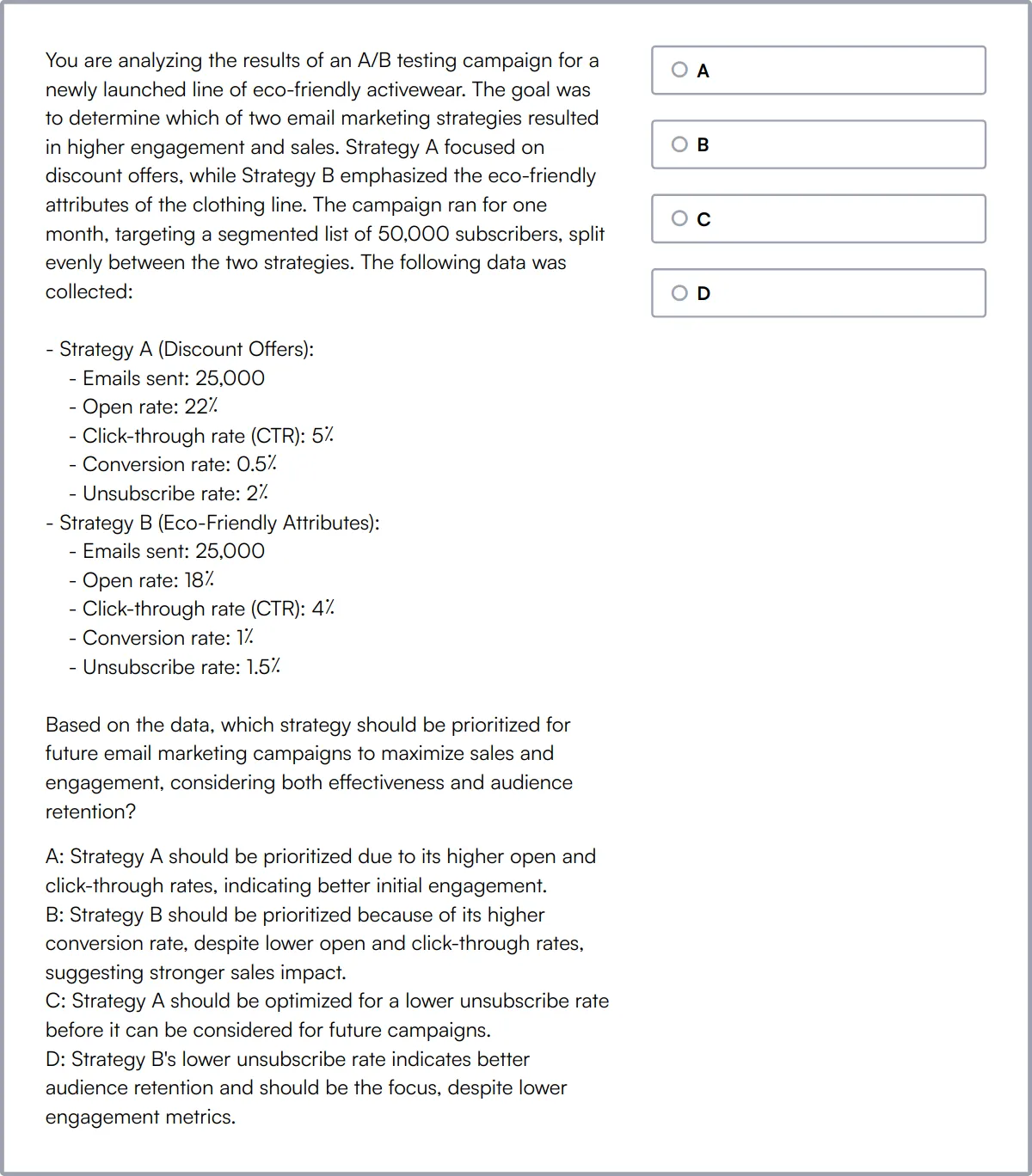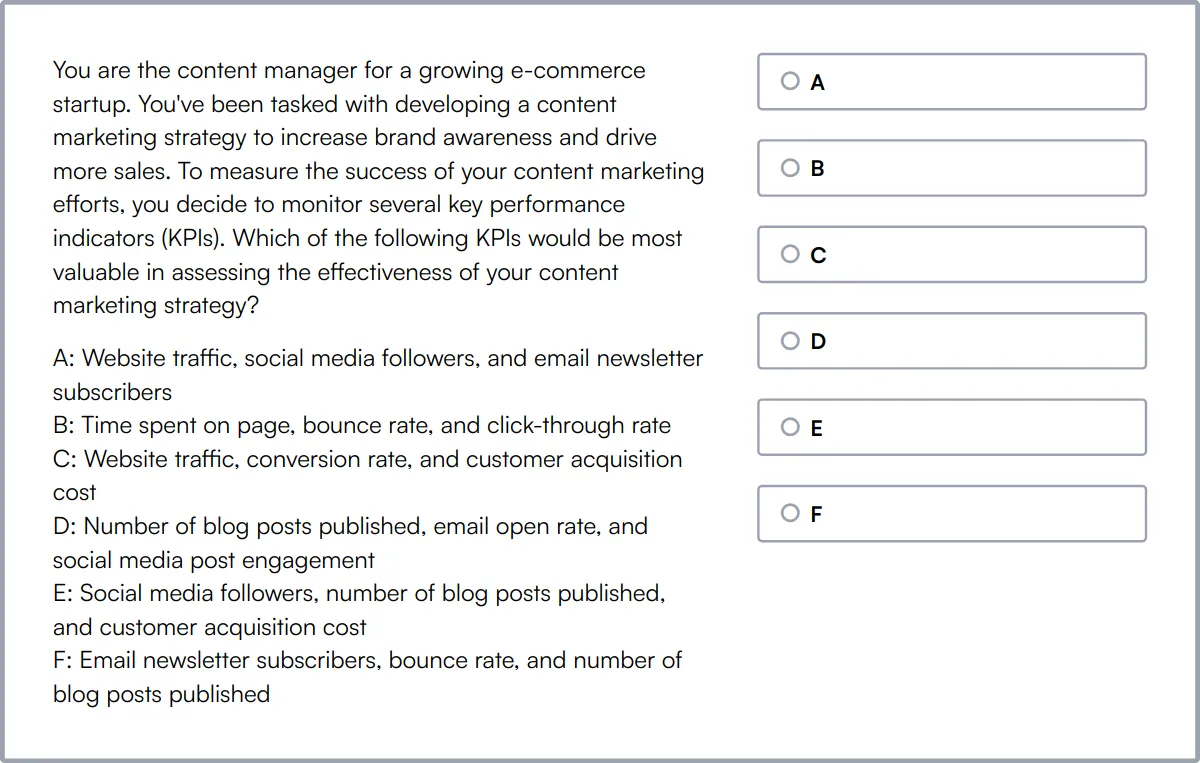The right brand strategist crafts the identity and direction of your brand. They align branding efforts with business goals, ensuring cohesive and compelling brand narratives across multiple channels.
Brand strategist skills include expertise in market research, competitive analysis, and brand positioning, along with capabilities like creative thinking and strategic communication.
Candidates can write these abilities in their resumes, but you can’t verify them without on-the-job Brand Strategist skill tests.
In this post, we will explore 7 essential Brand Strategist skills, 9 secondary skills and how to assess them so you can make informed hiring decisions.
Table of contents
7 fundamental Brand Strategist skills and traits
The best skills for Brand Strategists include Market Research, Competitive Analysis, Brand Development, Digital Marketing Strategy, Consumer Insights, Positioning Strategy and Marketing Analytics.
Let’s dive into the details by examining the 7 essential skills of a Brand Strategist.

Market Research
Market research allows a brand strategist to gather and analyze data about consumers' needs, preferences, and behaviors. By understanding the market landscape, they can identify opportunities and threats, enabling the development of strategies that align with target audiences. The insights gained facilitate informed decision-making and enhance brand positioning.
Check out our guide for a comprehensive list of interview questions.
Competitive Analysis
For a brand strategist, analyzing competitors is key to crafting strategies that give a brand its edge. By assessing competitors' strengths, weaknesses, and market positioning, they can uncover gaps in the market and create unique value propositions. This helps in differentiating the brand and capturing competitive advantage in the marketplace.
Brand Development
This involves creating and nurturing a brand's identity, including name, logo, and messaging. A brand strategist shapes the brand story and its core values, ensuring consistency across all channels. By doing so, they build a strong perception in the minds of consumers, which is critical for long-term brand loyalty.
For more insights, check out our guide to writing a Brand Strategist Job Description.
Digital Marketing Strategy
In the digital age, a brand strategist must leverage online platforms to enhance brand visibility and engagement. This includes identifying the right digital channels, creating engaging content, and using data analytics to measure campaign performance. A well-crafted digital strategy expands reach and strengthens the brand's digital footprint.
Consumer Insights
Understanding consumer behavior and preferences is vital for creating relevant brand strategies. A brand strategist uses qualitative and quantitative methods to dive into consumer mindsets, uncovering motivations and pain points. These insights drive the creation of marketing strategies that resonate with the target audience and foster brand loyalty.
Positioning Strategy
Positioning is about defining how a brand is perceived relative to competitors in the marketplace. A brand strategist focuses on crafting a clear, distinct, and desirable place for the brand in the minds of consumers. Effective positioning ensures that the brand stands out, creating a compelling reason for consumers to choose it over alternatives.
Marketing Analytics
A brand strategist utilizes data and analytics tools to measure and optimize marketing efforts. By interpreting metrics such as customer engagement and conversion rates, they gain insights into what's working and what's not. This analytical approach allows for evidence-based strategy adjustments, enhancing marketing efficiency and ROI.
Check out our guide for a comprehensive list of interview questions.
9 secondary Brand Strategist skills and traits
The best skills for Brand Strategists include Content Creation, Social Media Management, Public Relations, Trend Analysis, Project Management, Graphic Design, Email Marketing, Sales Strategy and Negotiation Skills.
Let’s dive into the details by examining the 9 secondary skills of a Brand Strategist.

Content Creation
Crafting content that aligns with the brand's voice is a valuable skill. This involves writing, editing, and curating messages that engage and inform the audience across different platforms.
Social Media Management
Handling the brand's presence on social media platforms involves more than just posting content. It requires understanding platform dynamics, engaging with followers, and using analytics to refine strategies.
Public Relations
Managing the brand's public image and reputation is crucial. A brand strategist may work with PR teams to craft press releases, manage media relationships, and respond to public inquiries.
Trend Analysis
Keeping abreast of industry and consumer trends helps in anticipating changes in the market. By spotting trends early, a brand strategist can adjust strategies to keep the brand relevant and forward-thinking.
Project Management
Overseeing the execution of brand strategies involves coordinating teams and resources effectively. Strong project management ensures that branding initiatives are delivered on time and within budget.
Graphic Design
While not always mandatory, having a basic understanding of graphic design can be beneficial. It allows a brand strategist to better communicate visual ideas and collaborate with design teams.
Email Marketing
Crafting targeted email campaigns to nurture leads and retain customers can be a valuable tool. Using email marketing platforms to segment audiences and track campaign success is part of this skill.
Sales Strategy
Aligning branding efforts with sales strategies ensures a cohesive approach to market penetration. Understanding sales dynamics helps in crafting strategies that support sales goals and drive revenue.
Negotiation Skills
Whether securing partnerships or media placements, negotiation skills enable a brand strategist to secure favorable terms. This involves persuasion, communication, and understanding of the other party's needs.
How to assess Brand Strategist skills and traits
Evaluating the skills and traits of a Brand Strategist requires a nuanced approach, given the multifaceted nature of the role. A Brand Strategist must blend analytical prowess with creative thinking to guide a brand's growth. Traditional resumes may not fully capture a candidate’s ability to develop a robust brand strategy. Thus, adopting skills-based assessments can provide a more comprehensive understanding of one's capabilities.
Resumes might list accomplishments and past experiences, but they often miss out on demonstrating a candidate’s adaptability and strategic thought processes. By employing talent assessments that focus on key skills like market research, competitive analysis, and digital marketing strategy, hiring managers can better identify the perfect fit for their team. Adaface assessments offer an insightful way to evaluate these competencies, resulting in up to a 2x improvement in the quality of hires while reducing screening time by 85%.
Let’s look at how to assess Brand Strategist skills with these 5 talent assessments.
Market Research Test
Our Market Research Test evaluates a candidate's knowledge and skills in market research techniques and data interpretation.
This test covers market analysis, data analysis, and quantitative aptitude, highlighting a candidate's ability to gather insights into consumer preferences.
Candidates who excel demonstrate strong skills in business intelligence and data-driven decision-making.

Marketing Analysis Test
The Marketing Analysis Test examines a candidate’s ability to analyze marketing principles and trends.
It tests knowledge in digital marketing, Google Ads, PPC advertising, and SEO, as well as a candidate's marketing aptitude.
High-scoring individuals show deep understanding of consumer behavior and can devise effective content strategies.

Branding Strategy Test
The Branding Strategy Test gauges a candidate's expertise in developing and implementing brand strategies.
It evaluates skills in brand identity, market positioning, and customer experience. Candidates must navigate branding scenarios that test their strategic thinking.
Successful candidates understand brand lifecycle management and demonstrate ability in global brand management.
Digital Marketing Test
The Digital Marketing Test evaluates skills in digital marketing techniques, including social media and SEO.
The test challenges a candidate’s ability to analyze platforms, including Google Analytics and AdWords, as well as content and email marketing.
High-scoring candidates show proficiency in social media analytics and understand varied ecommerce marketing strategies.

Data Analysis Test
The Data Analysis Test assesses a candidate's skills in handling data analysis and interpretation.
This test includes questions on business analysis, data interpretation, and SQL skills, focusing on candidates' ability to derive insights.
Candidates proficient in data modelling and predictions show deep analytical thinking and problem-solving abilities.

Summary: The 7 key Brand Strategist skills and how to test for them
| Brand Strategist skill | How to assess them |
|---|---|
| 1. Market Research | Evaluate how well one gathers and interprets market data. |
| 2. Competitive Analysis | Assess ability to identify and analyze competitor strengths and weaknesses. |
| 3. Brand Development | Judge capacity to create and grow a brand identity. |
| 4. Digital Marketing Strategy | Review skills in planning and executing online marketing campaigns. |
| 5. Consumer Insights | Analyze understanding of consumer behavior and needs. |
| 6. Positioning Strategy | Examine ability to position a brand in the market. |
| 7. Marketing Analytics | Assess competence in interpreting and leveraging marketing data. |
LinkedIn Marketing Test
Brand Strategist skills FAQs
How can we assess a candidate's skills in market research?
Review their ability to conduct surveys and analyze data, and ask for examples of market research projects they’ve led. Look for strong analytical skills and familiarity with research tools.
What should we look for when evaluating competitive analysis skills?
Assess their ability to identify competitors’ strengths and weaknesses. Request case studies or examples of previous analyses they've performed to understand their approach.
What indicates strong brand development skills in a candidate?
Look for candidates with a track record in building brands. Ask for portfolios or campaigns they've worked on to observe their creative vision and strategic thinking.
How do we gauge expertise in digital marketing strategy?
Check their experience with digital tools and platforms. Inquire about their past strategies and how they tailored them to meet specific business goals.
What are effective ways to evaluate consumer insights skills?
Ask for examples where they successfully used consumer insights to drive decisions. Evaluate their ability to interpret data to unlock meaningful trends and observations.
How can we assess project management skills in a brand strategist?
Discuss past projects to understand how they managed scope, timelines, and resources. Look for examples of their problem-solving abilities in handling project challenges.
What should we ask to determine a candidate's trend analysis capabilities?
Inquire about how they stay updated with industry trends and how they apply this knowledge to strategy. Request recent examples where their trend analysis impacted outcomes.
Which questions reveal proficiency in sales strategy and negotiation?
Ask how they've aligned brand strategy with sales goals. Discuss scenarios where they successfully negotiated partnerships or influenced stakeholder decisions.

40 min skill tests.
No trick questions.
Accurate shortlisting.
We make it easy for you to find the best candidates in your pipeline with a 40 min skills test.
Try for freeRelated posts
Free resources



